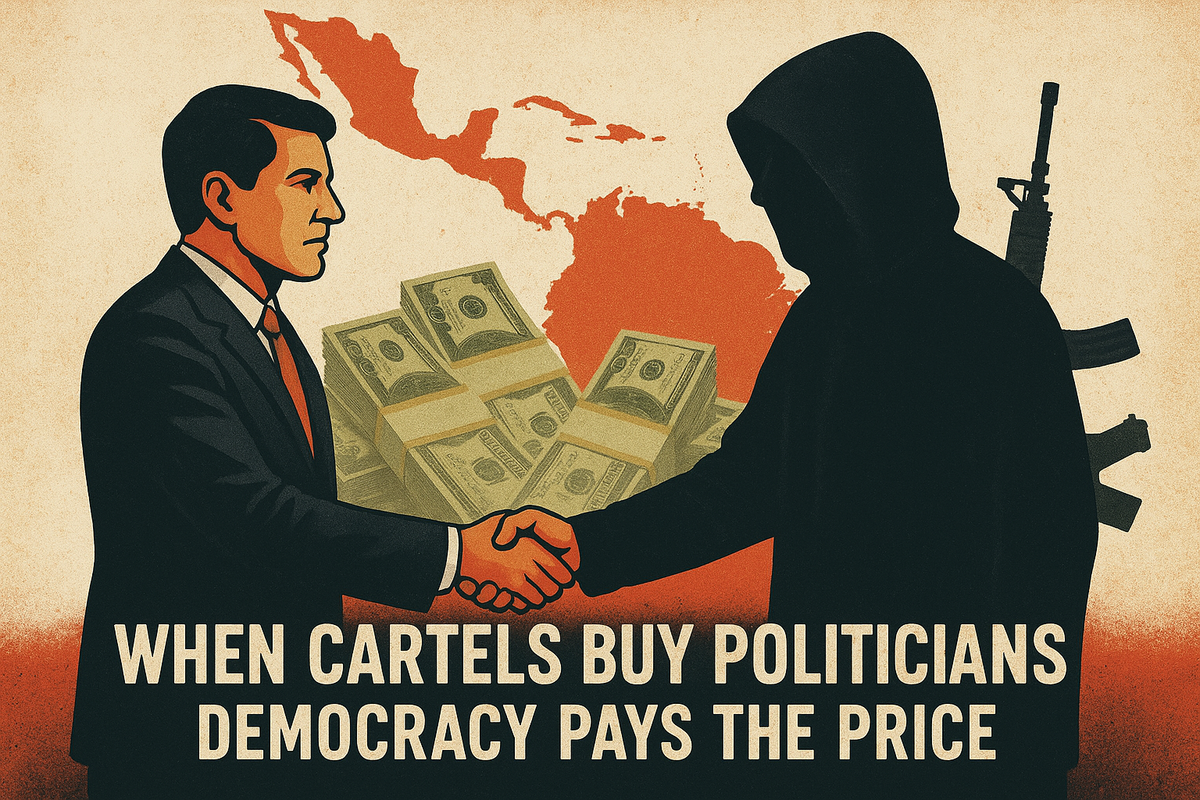Narco-Politics: How Cartels Are Writing Laws in Latin America
Latin America’s cartels no longer hide in jungles they sit in congress halls. Narco-politics reveals how cartels infiltrate elections, bribe lawmakers, and write laws that protect crime instead of citizens.

Introduction: When the Bullet Becomes the Ballot
In Latin America, politics and organized crime have long danced together. But what was once a shadowy handshake behind closed doors has evolved into something more brazen. Cartels aren’t just buying off politicians anymore they’re actively shaping laws, controlling local governments, and in some cases, fielding their own candidates. This isn’t corruption on the margins; it’s narco-politics, where the men with guns become the men with pens.
When you trace the power lines of Mexico, Colombia, Guatemala, or Honduras, you don’t just see state institutions you see cartel influence baked directly into the DNA of political systems. The question isn’t if cartels control politics; it’s how much of the law itself has been rewritten in their favor.
The Evolution of Narco-Politics
Decades ago, cartels operated like parasitic organisms, leeching from politicians who could shield them from prosecution. But parasitism has given way to symbiosis. Cartels realized that why bribe politicians when you can become them—or better yet, fund enough of them to write favorable laws?
- In Mexico, cartels like the Sinaloa and Jalisco New Generation Cartel (CJNG) back local candidates during municipal elections, ensuring loyal mayors and police chiefs.
- In Guatemala and Honduras, cartel-linked families have financed entire political parties.
- In Colombia, paramilitary groups and narco-bosses penetrated Congress so deeply that in the 2000s nearly a third of lawmakers were investigated for ties to cartels or paramilitaries.
This isn’t a one-off scandal; it’s an operating model.

Ballots, Bribes, and Bullets: How Cartels Enter Politics
Cartels operate with a simple toolkit: fear, finance, and favors.
- Fear: Candidates who resist cartel control face assassination. In Mexico’s 2021 elections, over 90 politicians were murdered in pre-election violence, many for refusing cartel deals.
- Finance: Cartels bankroll campaigns, laundering drug profits into political war chests.
- Favors: Politicians in power return the favor by softening security policies, ignoring cartel activity, or ensuring favorable judicial appointments.
Once elected, these “narco-candidates” don’t just protect cartel interests they rewrite local governance. Municipal police are handpicked. Construction contracts flow to cartel-linked companies. Even education and healthcare budgets get siphoned to fund criminal empires.
Laws Written in Blood: The Cartel’s Legal Playbook
How exactly do cartels bend the law to their will? They exploit weak institutions by pushing for:
- Amnesty-style initiatives framed as peace deals, but really designed to shield cartel leaders.
- Changes in extradition policies, making it harder to ship drug lords to the U.S. where trials are harder to influence.
- Regulation of legitimate industries like agriculture, mining, and transport that cartels use for money laundering.
- Decentralization of policing, which lets cartel-friendly local forces control law enforcement instead of federal oversight.
A chilling example is found in Colombia’s “parapolitics scandal.” For years, paramilitary drug lords worked hand in glove with legislators to pass laws that legalized land grabs and weakened penalties for demobilized fighters essentially laundering both money and crimes.

The Cartel Candidate: When Drug Lords Run for Office
It might sound like a Netflix script, but Latin America has seen cartel figures openly run for political office.
- In Guatemala, Manuel Baldizón, a presidential candidate, was later arrested for laundering drug money through his campaign.
- In Mexico, municipal elections in cartel-heavy states like Michoacán and Guerrero have featured candidates with open cartel ties.
- In Colombia, regional politicians linked to narco-paramilitary groups became so numerous that the country coined the term “parapolitics.”
What makes these candidates appealing to voters? In regions where the state has failed, cartels provide “order.” They build schools, pave roads, and hand out aid. For communities long abandoned by central governments, a narco-politician isn’t just a criminal he’s the only one delivering results.
The Narco-State in Disguise
When cartels infiltrate politics, they don’t announce themselves. They wear the mask of democracy, but the machinery underneath is cartel-driven. The result is a narco-state in disguise a place where the line between government and cartel is erased.
This is most visible in local municipalities. In some parts of Mexico, residents know their real mayor isn’t the one sitting in the office but the cartel boss pulling the strings. Police patrols are cartel militias in uniform. Judges are bought or threatened. Even the economy bends farmers must sell crops through cartel-controlled supply chains, while local businesses pay “taxes” to the cartel treasury.
The Human Cost: Communities Held Hostage
Narco-politics doesn’t just warp democracy; it shatters lives. Entire towns are forced into silence. Teachers indoctrinate students with cartel narratives. Journalists are silenced through assassination or exile. Communities that resist face massacres.
Take Michoacán, Mexico, where cartel-backed politicians allowed armed groups to dominate local economies. Avocado farmers, forced to pay “protection taxes,” faced ruin if they refused. Or Honduras, where drug-linked politicians turned whole regions into trafficking corridors, leaving residents caught in the crossfire.
The result? People vote not with free will but under the invisible gun of narco-power.
International Ripples: Why the World Should Care
It’s tempting to see narco-politics as a regional problem, but its impact is global.
- Drug supply chains: Cartel-friendly laws ensure steady flows of cocaine, fentanyl, and meth to global markets.
- Migration crises: Violence and instability drive millions northward, straining borders and fueling political debates in the U.S. and Europe.
- Weak democracies: Narco-politics erodes faith in democracy, creating vacuums that authoritarianism can fill.
Cartel infiltration doesn’t just destabilize Latin America; it reshapes geopolitics.

Can Democracy Survive Narco-Politics?
The fight against narco-politics isn’t just about capturing drug lords it’s about protecting the soul of democracy. Solutions must go beyond military crackdowns, which often fuel more violence. Instead, reform requires:
- Electoral transparency: Stronger monitoring of campaign finance to cut off cartel money.
- Judicial independence: Shielding judges from cartel influence through international oversight.
- Community investment: Providing real alternatives to cartel “social programs.”
- International cooperation: Cross-border accountability to prevent cartels from exploiting weak jurisdictions.
But most of all, it requires political courage something that too often vanishes when cartel money is on the table.
Conclusion: When the Law Belongs to the Cartel
Narco-politics isn’t just corruption it’s the hijacking of democracy. When drug cartels write laws, every statute becomes a tool of violence, every election a masquerade, and every community a hostage.
Latin America’s future depends on whether its leaders can untangle politics from cartel money. Because once bullets turn into ballots, and ballots into laws, reclaiming democracy becomes more than difficult it becomes almost impossible.
Sources
- Insight Crime – Cartel Influence in Latin American Politics
- Brookings Institution – Criminal Governance and Narco-States in Latin America
- International Crisis Group – The Politics of Drugs and Violence in Mexico, Colombia, and Beyond
- The Guardian – Investigative reporting on cartel infiltration of local governments
- Reuters – Coverage of elections influenced by organized crime in Mexico
- BBC News – How Drug Cartels Shape Latin American Democracy




